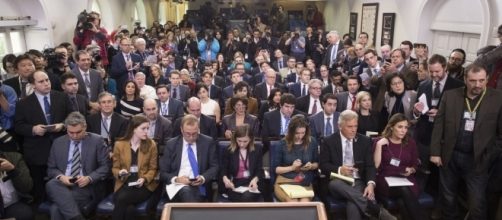President Trump's widely reported conflicts with the press have reached an all-time high this week with him threatening to cancel press briefings following conflicting statements over the firing of former FBI director James Comey. President Trump tweeted from his personal Twitter account that he would consider canceling White House press briefings since his surrogates can't seem to unite behind one single message. As a solution, he also suggested handing out written statements instead for the sake of "accuracy."
As a very active President with lots of things happening, it is not possible for my surrogates to stand at podium with perfect accuracy!....
— Donald J. Trump (@realDonaldTrump) May 12, 2017
...Maybe the best thing to do would be to cancel all future "press briefings" and hand out written responses for the sake of accuracy???
— Donald J. Trump (@realDonaldTrump) May 12, 2017
One of Trump's surrogates, Newt Gingrich, was asked on Fox News about the President's tweet on Friday, to which he said that cancelling the press briefings would be an interesting "experiment" to shut down the briefing room and let the press hang out at the local Starbucks.
Mixed messages
It's said that the President was responding to his Thursday NBC News interview with Lester Holt, where, when asked about the decision to fire Comey, he said that he was going to fire him anyway despite statements from others that the Department of Justice (DOJ) made the recommendation. This was based on what press secretary Sean Spicer said on Tuesday when he said that the President got a written recommendation from Rod Rosenstein, the Deputy Attorney General from the DOJ.
During Friday's press briefing, Spicer said that due to the President's robust schedule, he wasn't always able to get accuracy from the President before going to the podium and asked the media for some leniency.
Vice President Mike Pence also made a similar statement, saying that the President accepted the DOJ's recommendation. Even the Deputy Press Secretary Sarah Huckabee Sanders said the same thing on Wednesday, in reference to President Trump following the guidance of his top advisers.
Who's the boss?
The conflicting statements began when President Trump wanted to present himself as the one who controls the final outcome, not simply from the advice of others but as the one who even had the plan to fire Comey to begin with. The NBC News interview with the President took place an hour before a press briefing with Sanders, who denied that there were conflicting statements, but also refuted reports that Rosenstein threatened to quit over the administration trying to pin the firing of James Comey on him.
After the inauguration, there was much discussion about how the White House would conduct press briefings, with suggestions that they wouldn't hold them anymore. As these discussions were taking place, the media expressed concern that they would be ousted and not allowed to hold Trump accountable from the traditional press room. As Blasting News detailed in the link provided, there were even reports of plans to hold briefings outside of the White House.


